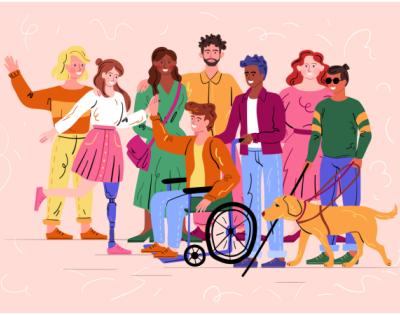
Individuals with Disabilities
Individuals with disabilities form the largest minority group in the United States. Approximately 25% of Americans have a disability, encompassing a diverse range of abilities, ages, races, sexualities, ethnicities, religions, and socio-economic backgrounds.
The Americans with Disabilities Act National Network defines disability as a physical or mental impairment that substantially limits major life activities. However, disability affects each person uniquely, encompassing a spectrum of conditions. It's crucial to understand that disability isn't something that exists 'without'; with proper accommodations, understanding, and support, individuals with disabilities can lead fulfilling lives.
It’s important to note that not all disabilities are visible. Studies suggest that 70-80% of disabilities are invisible, including intellectual, physical, sensory, mental, and chronic illnesses. However, it's important not to invalidate someone's identity and experiences simply because their disability isn't immediately apparent or doesn't conform to expectations.
Disability Pride Month
In honor of the Americans with Disabilities Act (ADA) passed in July 1990, Disability Pride Month is celebrated annually during July. This observance highlights the positive pride felt within the disability community, promoting visibility and awareness. Its goal is to educate and empower both individuals with disabilities and society at large. Disability Pride Month invites us to celebrate the unique experiences and contributions of people with varying abilities, fostering a more inclusive and understanding world.
How to Celebrate and Advocate This Month
- Educate Yourself and Loved Ones
- Educate yourself and your loved ones on what it means to have Disability Pride. Learn about disability history and gain a better understanding of the discrimination faced by disabled people, both past and present.
- Be an Advocate
- Celebrate the accomplishments and strengths of disabled people!
- Make accessibility a priority by ensuring environments have the proper accommodations and supports.
- Celebrate Uniqueness
- Recognize that each person with a disability is different and has their own unique life experiences and appreciate these differences.
- Stand Up Against Ableism
- Ableism refers to discrimination or prejudice against individuals with disabilities. It encompasses attitudes, practices, policies, and beliefs that devalue and limit the opportunities of people with disabilities and can manifest in various forms. Recognize and educate yourself on the barriers, microaggressions, and stereotypes concerning disability, and actively fight against them.
- Check on Mental Health
- Whether it be your own or someone you love, check in on others. Sometimes, differences can make us feel isolated, but intersectionality is an integral part of our society.
- If you or someone you know wants to speak to a mental health professional, The Village is home to a large number of caring providers, including licensed counselors, therapists, social workers, and other staff members who can help.
Please note: In this blog we used the terms “person with disability” and “disabled person” interchangeably, to respect how different people identify with their disability. Some people might prefer to use identify first language (ex. Disabled, autistic, deaf, etc) and some may prefer person-first language (ex. person with disability, person with autism, person with hearing loss, etc.). It’s important to listen to people’s preferences and respect how they choose to identify.